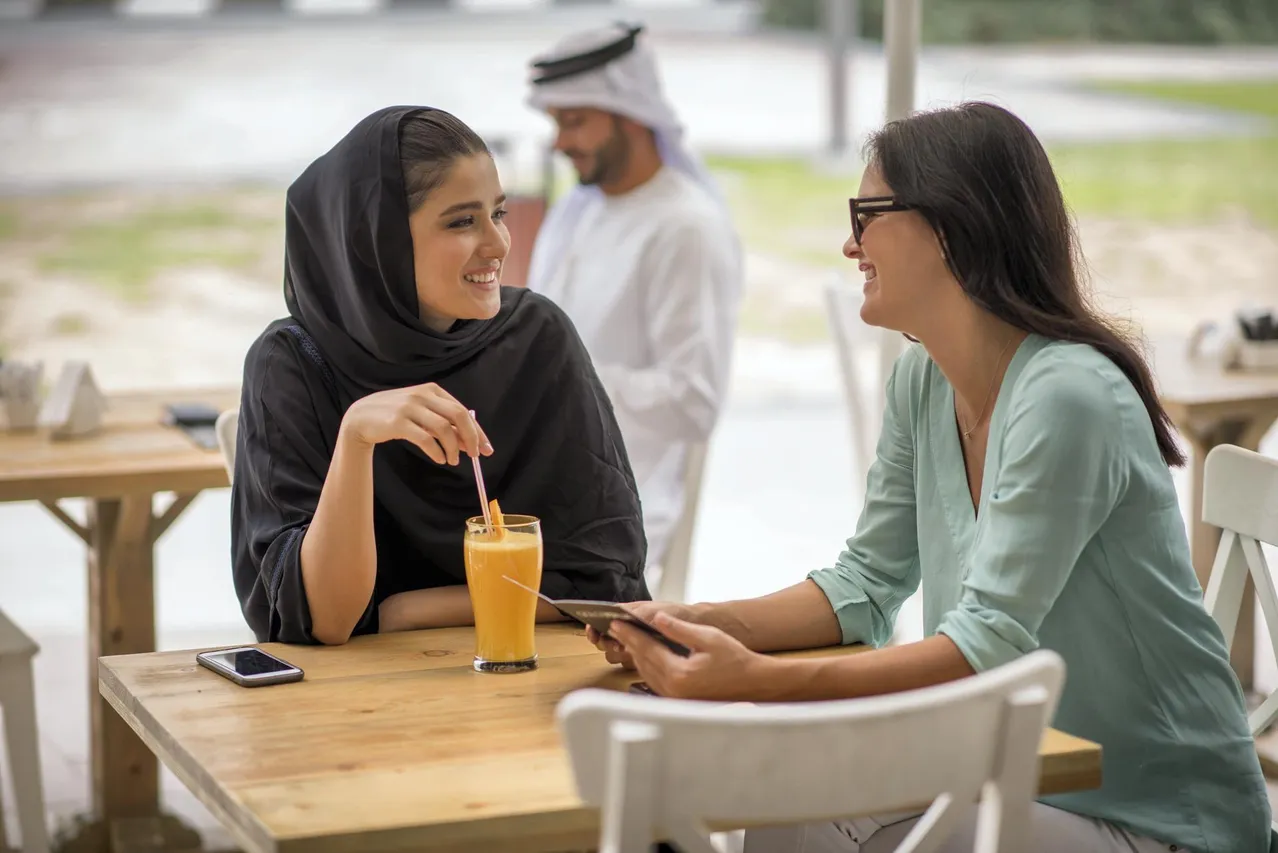Blog
Habibti: Unveiling the Endearing Power and Cultural Significance Within the Arabic-Speaking Community


@The National
Habibti, a term of endearment in Arabic, carries a deep sense of affection and love. Derived from the word “habib,” meaning beloved or dear, habibti is commonly used to address a female loved one, such as a girlfriend, wife, or daughter. This charming word encapsulates the warmth and tenderness that exists within Arabic culture and language. In Arabic-speaking countries, the usage of habibti is not limited to romantic relationships. It is also employed to express care and affection towards close female friends or family members. Whether whispered softly or exclaimed joyfully, habibti is a term that conveys a sense of cherished connection and emotional intimacy. As we delve deeper into the significance of habibti, we will explore its cultural nuances, its role in interpersonal relationships, and the impact it has on the Arabic-speaking community. Join us on this journey to uncover the beauty and depth behind this enchanting term of endearment.
Cultural Significance of Habibti
Habibti carries immense cultural significance within the Arabic-speaking community. It goes beyond a simple term of endearment and is deeply intertwined with the values, traditions, and interpersonal relationships within the culture. Showcasing Affection: Habibti is commonly used to express love and affection towards female loved ones, including romantic partners, family members, and close friends. It serves as a way to convey care and reverence for these cherished individuals. Gender Dynamics: The term reflects the cultural norms and gender dynamics prevalent in the Arab world. It highlights the importance of showing respect and appreciation towards women, emphasizing their role as beloved figures in society. Friendship Bonds: Habibti also extends beyond the realm of romantic relationships. It serves as a means to strengthen bonds of friendship among women, highlighting the closeness and loyalty shared between female friends. Family Ties: Within the family context, habibti conveys the deep affection and connection between parents and their daughters or sisters. It reinforces the importance of nurturing and cherishing family relationships. Cultural Identity: The usage of habibti is a testament to the preservation of cultural identity within the Arabic-speaking community. It reflects the cultural values of love, respect, and the celebration of close relationships. The cultural significance of habibti lies in its ability to communicate deep emotions, reinforce social bonds, and affirm the importance of personal connections within the Arabic-speaking community. This endearing term will continue to play a vital role in interpersonal relationships for generations to come.Habibti in Interpersonal Relationships
Habibti holds immense significance within interpersonal relationships in the Arabic-speaking community. It serves as a term of endearment used to express love and affection towards female loved ones, whether they are romantic partners, close friends, or family members. Here are a few key points to understand how habibti operates within these relationships:- Showcasing Affection: Habibti is a way to convey deep emotions and showcase affection for someone special. It goes beyond a generic term of endearment and carries a sense of warmth and intimacy.
- Reflecting Gender Dynamics: The use of habibti within interpersonal relationships reflects the gender dynamics prevalent in Arabic culture. It underscores the importance of cherishing and valuing women and their role in nurturing and maintaining relationships.
- Strengthening Friendship Bonds: Habibti is not limited to romantic relationships. It is often used among close female friends to reinforce their bond and express care and support for one another.
- Conveying Family Ties: Habibti is also employed within family relationships, serving as a reminder of the special connection and love shared between family members.
- Preserving Cultural Identity: The use of habibti within interpersonal relationships serves as a way to preserve cultural identity. It is a unique term that embodies the values, traditions, and language of the Arabic-speaking community.
Exploring the Impact of Habibti in the Arabic-speaking Community
Habibti, as a term of endearment, holds significant cultural importance within the Arabic-speaking community. It goes beyond a simple expression of affection and is deeply intertwined with the values, traditions, and interpersonal relationships of the culture.Key Points:
- Showcasing Affection: Habibti is used to express love and care towards female loved ones, emphasizing their importance and value within relationships.
- Gender Dynamics: The use of habibti reflects the gender dynamics prevalent in the Arabic-speaking community, where women are often cherished and respected.
- Strengthening Friendship Bonds: Habibti is not limited to romantic relationships and can also be used to solidify friendships, further strengthening the bond between close female friends.
- Conveying Family Ties: Within families, habibti is used to express deep connection and kinship between female relatives, reinforcing their closeness and support for one another.
- Preserving Cultural Identity: The use of habibti serves as a way to preserve cultural identity within the Arabic-speaking community, showcasing the importance of maintaining language and traditions.
- Habibi: The male counterpart of habibti, used to address male loved ones.
- Ya Habibti: An extended form of habibti, often used to convey stronger and deeper feelings of love and affection.
Conclusion
The term “habibti” holds immense cultural significance within the Arabic-speaking community. It serves as more than just a term of endearment, but rather as a reflection of the values, traditions, and interpersonal relationships that shape the culture. Habibti is a powerful expression of affection towards female loved ones, a reflection of gender dynamics, a means to strengthen friendship bonds, a way to convey family ties, and a tool to preserve cultural identity. Its male counterpart, “habibi,” and the extended form, “ya habibti,” further amplify feelings of love and affection. Through its usage, habibti continues to foster emotional bonds and maintain strong connections within the Arabic-speaking community. It is a testament to the depth and richness of the culture, showcasing the importance of love, respect, and kinship.Frequently Asked Questions
What is the meaning of “habibti”?
“Habibti” is an Arabic term of endearment used primarily to express affection towards female loved ones. It signifies a deep emotional bond within the Arabic-speaking community.How is “habibti” culturally significant?
“Habibti” holds cultural significance by reflecting gender dynamics, strengthening friendship bonds, conveying family ties, and preserving cultural identity. It goes beyond a simple term of endearment and plays a crucial role in interpersonal relationships within the Arabic-speaking community.Are there any related terms to “habibti”?
Yes, the male counterpart of “habibti” is “habibi.” Additionally, an extended form of “habibti” is “ya habibti,” which conveys stronger feelings of love and affection.What is the overall impact of “habibti”?
“Habibti” fosters emotional bonds and maintains strong connections within the Arabic-speaking community. It is a powerful expression of love and endearment, showcasing the values, traditions, and cultural identity of the community.Recent Posts
BlockDAG And Best Wallet Presale Participants Receive Free Skyren DAO Airdrop
Token airdrops have historically introduced investors to new blockchain projects. However, many distributions fail to…
2 months ago
Skyren DAO Token Surge Event: Remittix And Lightchain AI Communities First To Benefit
Airdrops have traditionally been used to introduce new investors to blockchain projects, but their effectiveness…
3 months ago
Bitcoin ETF Approval? Old News. Here’s Why Skyren DAO Could Outperform BTC 10-fold
The approval of Bitcoin ETFs was one of the most anticipated events in crypto history,…
3 months ago
Qubetics And Rexas Finance Holders: Claim Your 500 Free SKYRN Tokens Now
The blockchain space continues to evolve, with projects pushing security, scalability, and user engagement to…
3 months ago
Cardano Skyren DAO And Remmitix Potential Highlighted As Market Optimism Rises
As the cryptocurrency market recovers from recent volatility, several projects emerge as strong contenders for…
3 months ago
Cardano And Litecoin Ready To Rally: Analysts Predict 10x Gains For This Newcomer
The cryptocurrency market is showing strong bullish signals, with many altcoins poised for significant gains.…
3 months ago

